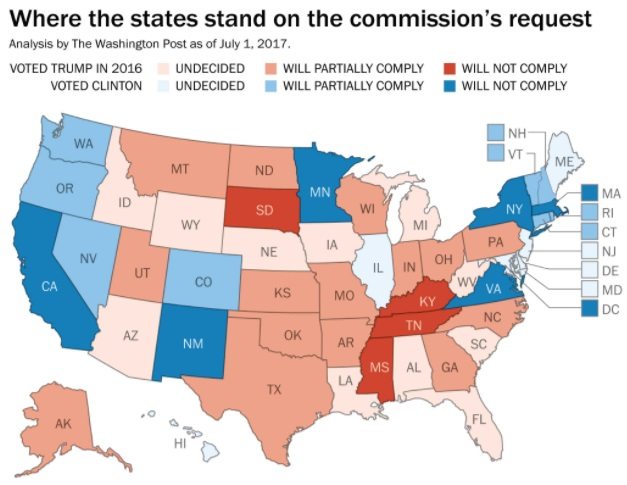
July 4th, 2017; CNN
Last week, the President’s Advisory Commission on Election Integrity rolled into action and raised a big fuss. In a letter from its Vice Chairman, Kansas Secretary of State Kris Kobach, it asked each state to provide input and also detailed voter records dating back to 2006. For some states, the creation of this voter database was a sign of the Commission’s real purpose: the beginning of a national effort to repress the voting power of poor and minority voters. Each state must decide whether and how to comply.

It is the commission’s stated objective to “fully analyze vulnerabilities and issues related to voter registration and voting.” President Trump created the commission in May after he falsely claimed that as many as five million illegal voters, including many undocumented immigrants, had tainted the November election. In naming Vice President Mike Pence and Kansas Secretary of State Kris Kobach, both proponents of stronger voter identification laws, to lead the commission, he seemed to be making it clear that its purpose was to lead a national voter suppression effort. The commission’s letter to the states did little to assuage this fear.
These concerns would have faded if all the commission sought to do was gather input and guidance from state officials knowledgeable about their election processes. However, the areas of concern listed by Kobach cover a wide range of issues.
Kobach’s letter to Connecticut Secretary of State Denise Merrill asks,
- What changes, if any, to federal election laws would you recommend to enhance the integrity of federal elections?
- How can the Commission support state and local election administrators with regard to information technology security and vulnerabilities?
- What laws, policies, or other issues hinder your ability to ensure the integrity of elections you administer?
- What evidence or information do you have regarding instances of voter fraud or registration fraud in your state?
- What convictions for election-related crimes have occurred in your state since the November 2000 federal election?
- What recommendations do you have for preventing voter intimidation or disenfranchisement?
- What other issues do you believe the Commission should consider?
Further, it requested
the publicly available voter roll data…including…the full first and last names of all registrants, middle names or initials if available, addresses, dates of birth, political party (if recorded in your state), last four digits of social security number…voter history (elections voted in) from 2006 onward, active/inactive status, cancelled status, information regarding any felony convictions, information regarding voter registration in another state, information regarding military status, and overseas citizen information.
Sign up for our free newsletters
Subscribe to NPQ's newsletters to have our top stories delivered directly to your inbox.
By signing up, you agree to our privacy policy and terms of use, and to receive messages from NPQ and our partners.
The request created a chorus of opposition from those fearful of how the information will be used or misused.
California’s Secretary of State Alex Padilla issued a statement that strongly spelled out the case of those who see the commission as having a nefarious purpose. It reads,
I will not provide sensitive voter information to a commission that has already inaccurately passed judgment that millions of Californians voted illegally. California’s participation would only serve to legitimize the false and already debunked claims of massive voter fraud made by the President, the Vice President, and Mr. Kobach. The President’s Commission is a waste of taxpayer money and a distraction from the real threats to the integrity of our elections today: aging voting systems and documented Russian interference in our elections…The President’s appointment of Kobach—who has a long history of sponsoring discriminatory, anti-immigrant policies including voter suppression and racial profiling laws—sends a clear and ominous message. His role as vice chair is proof that the goal of the commission is to enact policies that will result in the disenfranchisement of American citizens.
Other state responses include:
- “My reply would be: They can go jump in the Gulf of Mexico, and Mississippi is a great State to launch from. Mississippi residents should celebrate Independence Day and our State’s right to protect the privacy of our citizens by conducting our own electoral processes.” —Mississippi Secretary of State Delbert Hosemann
- “The President’s Commission has quickly politicized its work by asking states for an incredible amount of voter data that I have, time and time again, refused to release. My response to the Commission is, you’re not going to play politics with Louisiana’s voter data, and if you are, then you can purchase the limited public information available by law, to any candidate running for office. That’s it.” —Louisiana Secretary of State Tom Schedler
- “After each of the last three federal elections, I instructed the bipartisan boards of elections to conduct a review of credible allegations of voter fraud and voter suppression. The results of this review is [sic] already in the public domain and available to the Commission. Additionally, voter registration information is a public record and is available online. The Confidential information, such as the last four digits of a voter’s Social Security number or their Ohio driver license number is not publicly available and will not be provided to the Commission. In responding to the Commission, we will have ideas on how the federal government can better support states in running elections. However, we will make it clear that we do not want any federal intervention in our state’s right and responsibility to conduct elections. Every Sec. of State in the country should welcome the opportunity to describe what they do to ensure the integrity of the elections in their respective states.” —Ohio Secretary of State Jon Husted
It may also be worth noting that Kobach himself hesitated to provide the level of information his commission asked for. According to the Kansas City Star, “in a follow-up interview Friday, he said the state would not be sharing the Social Security information at this time.”
Critics fear that, with a national database in hand, the Trump administration will launch a national effort to bar eligible voters from the voting booths. Citizen advocacy organization Common Cause President Karen Hobert Flynn said in a statement that the commission would rely in part on the faulty Interstate Voter Registration Crosscheck program, launched by Kobach. According to Flynn,
The program has improperly cut hundreds of thousands of eligible voters from the registration rolls due to mismatches, in clear violation of the National Voter Registration Act…Kobach intends to check voter registration data against the SAVE (Systematic Alien Verification Entitlements) database to determine whether non-citizens are on the rolls despite the fact that the Department of Homeland Security has clarified that this is not an accurate database for updated citizenship records.
The administration remains convinced that voter fraud, despite the lack of any evidence of its existence, is a major threat to American democracy. If trust were not an issue, the commission’s effort to look again at the issue would be perhaps wasteful, but not viewed with the fear and suspicion. That the commission is led by individuals who have been actively working to challenge voting rights and make it harder to vote makes it very hard to trust their words. That they appear to be ignoring the vulnerability of our voting systems to manipulation by hackers and the possibility of foreign interference adds to the concern of those now speaking to against their work. Both Pence and Kobach have troubling histories in this area; this fear is well-grounded and the spotlight needs to remain focused on the commission.—Marty Levine












